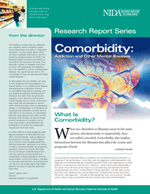
|

|
|
What's New at the National Institute on Drug Abuse  Neurotransmitters, or brain chemicals, play a key role in the long-term changes that allow a brain to adapt continuously in response to experience. This hinges on the ability of neurotransmitters to change the efficiency with which neurons communicate with one another. In the striatum, a brain region critically involved in certain types of learning, dopamine is the main chemical responsible for tuning the efficiency of this communication up and down. Two types of dopamine receptors (D1 and D2) were previously thought to have completely opposite functions in this process, whereby D1- and D2expressing neurons could only tune the strength of the connections either up or down, respectively. A new study funded in part by NIDA dispels that notion, demonstrating that conditions in the local brain environment can make it possible for both cell types to carry out either function, thereby resolving a long-standing scientific puzzle. Additional Research News Stories
News Releases Investigators funded by the National Institute on Drug Abuse have shown that the medication methylphenidate (Ritalin), which is commonly prescribed to treat attention-deficit hyperactivity disorder (ADHD), can cause physical changes in neurons in reward regions of mouse brains - in some cases, these effects overlapped with those of cocaine. Both methylphenidate and cocaine are in the class of drugs known as psychostimulants. While methylphenidate is widely prescribed, this study highlights the need for more research into its long-term effects on the brain. These research findings will be published Feb. 3 in Proceedings of the National Academy of Sciences.
Drug Abusing Offenders Not Getting Treatment They Need in Criminal Justice System The vast majority of prisoners who could benefit from drug abuse treatment do not receive it, despite two decades of research that demonstrate its effectiveness, according to researchers at the National Institute on Drug Abuse (NIDA), part of the National Institutes of Health. In a report published in the Journal of the American Medical Association, NIDA scientists note that about half of all prisoners (including some sentenced for non-drug-related offenses) are dependent on drugs, yet less than 20 percent of inmates suffering from drug abuse or dependence receive formal treatment.
NIDA Releases a New Research Report on Comorbidity of Addiction and Other Mental Illnesses The National Institute on Drug Abuse (NIDA), part of the National Institutes of Health, has released a research report, Comorbidity: Addiction and Other Mental Illnesses, summarizing the state of the science regarding the complex relationship between substance abuse and other mental disorders. The release of this report is timely given the increasing prevalence and link between post traumatic stress disorder and substance abuse, recently discussed at a NIDA sponsored meeting, Addressing Substance Abuse and Comorbidities Among Military Personnel, Veterans and Their Families.
Hot News On April 20th, NIDA launched its first comprehensive Physicians' Outreach Initiative, NIDAMED. NIDAMED gives medical professionals tools and resources to screen their patients for tobacco, alcohol, illicit, and nonmedical prescription drug use. The initiative stresses the importance of the patient-doctor relationship in identifying unhealthy behaviors before they evolve into life threatening conditions. The NIDAMED resources include an online screening tool, a companion quick reference guide, and a comprehensive resource guide for clinicians. The NIDAMED tools - targeting primary care clinicians - were unveiled at a news conference at the National Press Club that featured NIDA Director Dr. Nora D. Volkow, Acting Director of the Office of National Drug Control Policy Ed Jurith, J.D., Sen. Carl Levin of Michigan, Acting Surgeon General Steven K. Galson, M.D., and representatives from the World Health Organization, the American Medical Association, and other organizations committed to helping patients who struggle with drug-related medical issues. A patient-tested postcard, designed to compliment the physician screening materials, encourages patients to discuss any and all drug use with their doctors to help ensure proper medical care. Physicians are encouraged to place the postcards in their waiting rooms. Postcards and Quick Reference Guides are available on NIDA's research dissemination center, DrugPubs at http://www.drugabuse.gov/Pubcat/. or by calling 1-877-643-2644. The web-based materials can be accessed from www.drugabuse.gov/NIDAMED. Covering Addiction: A Roundtable for College Journalists NIDA's Office of Science Policy and Communications (OSPC) successfully hosted its first roundtable discussion for college journalism and communication majors. Fifteen students from universities around Washington D.C. arrived at the NIH campus on February 27 to partake in two question-and-answer sessions with NIDA scientists and some of the nation's top health journalists. The first topic of discussion, The Dope on Campus Drug Use, was led by NIDA Deputy Director Timothy Condon. Ruben Baler, Health Scientist Administrator with NIDA/OSPC; Dr. Amelia Arria of the University of Maryland in College Park, and Dr. Carol J. Boyd of the University of Michigan also participated. The second topic, Reporting on the College High, included respectable journalists such as Lisa Stark of ABC News, Lauran Neergaard of Associated Press, and Jacqueline Duda, a freelancer who contributes to The Washington Post. The second panel also included John Burklow of the NIH Office of Communications. The roundtable received positive feedback from the students, and OSPC is considering more roundtables in the other parts of the country.  Some comments from the students about the roundtable: NIDA Holds Meeting to Address Substance Abuse and Comorbidities Among Military Personnel  On January 6-7, NIDA convened a two-day meeting to address the issue of substance abuse and associated mental health problems among military personnel and their families. There is growing concern that military personnel returning from Iraq and Afghanistan are experiencing a range of difficulties, including traumatic brain injury (TBI), post traumatic stress disorder (PTSD), depression, anxiety, and tobacco, alcohol and drug abuse. The goals of the meeting were to gain an understanding of the intervention needs of military personnel, veterans, and their families regarding substance abuse and associated difficulties; discuss current prevention and treatment approaches being used with these populations; review existing drug abuse prevention and treatment interventions that may be appropriate for adapting and testing for use with these audiences; understand how to successfully conduct research in military and veteran settings; and formulate a research agenda for conducting addiction prevention. The meeting was organized in collaboration with the U.S. Army Medical Research and Material Command, the Department of Defense Health Affairs, the Army Center for Substance Abuse Programs, the Department of Veteran Affairs, the National Institute of Mental Health (NIMH), the National Institute on Alcohol Abuse and Alcoholism (NIAAA), the National Heart, Lung, and Blood Institute (NHLBI), and the National Cancer Institute (NCI). As a result of the discussions held, a series of recommendations for new research directions and priorities will be produced. The meeting generated media interest from outlets such as Reuters news service (see below), Associated Press, Addiction Professional and RedOrbit.com (an online publication). For more information, please contact Eve Reider. Interviews Dr. Volkow was interviewed by WBUR-FM/National Public Radio's show "On Point" as part of a panel discussion on cognitive-enhancing drugs. The program aired on more than 130 NPR stations nationwide.
Scientific American interviewed Dr. Volkow about addiction treatment in the criminal justice system. The story ran online on January 13.
NIDA's Dr. Ivan Montoya and Jessica Hammond were interviewed in December by U.S. News & World Report for an article about quitting smoking.
Reuters wire service interviewed Dr. Volkow and NIDA grantee Dr. Thomas Kosten for a story on January 7 following NIDA's two-day meeting addressing substance abuse and comorbidity among military personnel.
Publications & Website News The Office of Science Policy and Communications is working to make the NIDA Teen Website more fun, and to make NIDA's science more accessible to youth. Click on the links below to see some of our scientists speak to teens directly in these terrific new videos produced by PILB's Sharan Jayne, with script support from the scientists themselves. The videos feature Drs. Ruben Baler, Joseph Frascella, Gaya Dowling, and Redonna Chandler discussing our latest scientific understanding of the risks of using steroids, marijuana, and nicotine in an entertaining and educational style. More videos are in development, so stay tuned!
http://teens.drugabuse.gov/facts/facts_mj3.php
Other News  In January 2009, NIH launched its Research, Condition, and Disease Categorization (RCDC) system, a new trans-NIH computerized process designed to produce standard, reliable reports of the amount NIH funded in each of 215 historically reported categories across all of the NIH Institutes and Centers. The NIH recognizes the importance of keeping the American people informed about how their tax dollars are spent to support medical research. To enhance public accessibility to reports, data, and analyses of NIH research activities, the Research Portfolio Online Reporting Tool (RePORT) website (http://report.nih.gov/) will give the public a single access point to quickly and easily find data. For the first time, the public will be able to access a complete list of all NIH-funded projects related to each category and view, print, or download the detailed report. The shift to the new RCDC process of categorization changes the way individual research projects are assigned to categories and will likely result in differences in funding amounts from NIH reports issued in the past. These discrepancies do not reflect changes in how grants are reviewed or funded nor how NIH budgets and spends tax dollars throughout the year. For more information, please contact Gaya Dowling. Harlem Video Wins Prestigious Award
NIDA's MTV-style video of Dr. Volkow's conversation about the science of addiction with high school students in Harlem, New York has won a national Aegis Award. The Aegis Awards is one of the few video competitions that features true peer judging by fellow producers, directors, cameramen, editors, and other professionals who work in the video/film industry. The video was produced by the Office of Science Policy and Communications, and was the brainchild of OSPC's broadcast media specialist Sharan Jayne.   On February 5, NIDA held a meeting to report on the progress of, and plan the next steps for, the Centers of Excellence for Physician Information (CoE) program. The purpose of the NIDA CoEs, established in 2007, is to advance addiction awareness, prevention, and treatment in primary care practices by educating medical students, residents, and faculty on drug abuse and addiction in patient populations. The meeting debuted findings from a formative assessment measuring medical student and resident physician attitudes, beliefs, and behaviors on screening and treatment of substance abusing patients. It also evaluated how students prefer to obtain their information and the sources they use to learn more about drug abuse and addiction subject matters. The meeting also introduced the 11 curriculum resources developed by the CoEs as well as the findings from an extensive review of these resources. For the second half of the meeting, participants brainstormed on the next steps for the implementation and dissemination of CoE curriculum resources. The meeting was attended by representatives from each of the four Centers which are located at medical schools in North Dakota at the University of North Dakota; Nebraska at Creighton University; Pennsylvania, at the University of Pennsylvania and Drexel University; and a consortium of four schools in Massachusetts — including the University of Massachusetts, Boston University, Tufts University, and Harvard University. Also in attendance were representatives from the American Medical Association and JBS, International. Sample curriculum can be viewed at http://webcampus.drexelmed.edu/doccom/user/. Scroll down to see the learning module on the right hand side. No login is needed. |
|


